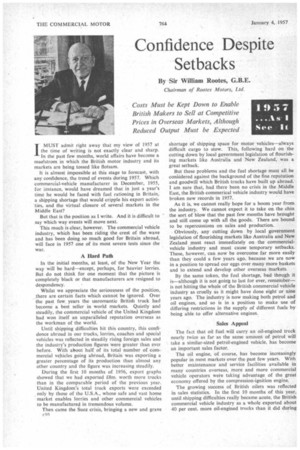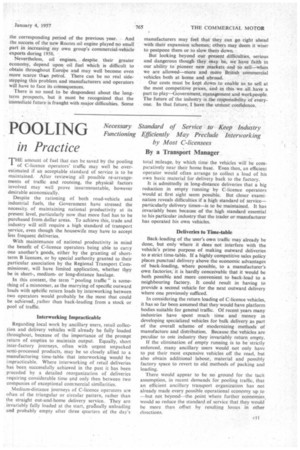Confidence Despite Setbacks
Page 50

Page 51

If you've noticed an error in this article please click here to report it so we can fix it.
By Sir William Rootes, G.B.E.
IMUST admit right away that my view of 1957 at the time of writing is not exactly clear and sharp. In the past few months, world affairs have become a maelstrom in which the British motor industry and its markets are being tossed like flotsam.
It is almost impossible at this stage to forecast, with any confidence, the trend of events during 1957. Which commercial-vehicle manufacturer in December, 1955, for instance, would have dreamed that in just a year's time he would be faced with fuel rationing in Britain, a shipping shortage that would cripple his export activities, and the virtual closure of several markets in the Middle East?
But that is the position as I write. And it is difficult to say which way events will move next.
This much is clear, however. The commercial vehicle industry, which has been riding the crest of the wave and has been doing so much good for Britain abroad, will face in 1957 one of its most severe tests since the war.
A Hard Path
In the initial months, at least, of the New Year the way will be hard—except, perhaps, for 'heavier lorries. But do not think for one moment that the picture is completely black or that manufacturers are resigned to despondency.
Whilst we appreciate the seriousness of the position, there are certain facts which cannot be ignored. Over the past few, years the unromantic British truck had become a best seller in world markets. Quietly and steadily, the commercial vehicle of the United Kingdom had won itself an unparalleled reputation overseas as the workman of the world.
Until shipping difficulties hit this country, this confidence abroad in our trucks, lorries, coaches and special vehicles was reflected in steadily rising foreign sales and the industry's production figures were greater than ever before. With about half of its total number of commercial vehicles going abroad, Britain was exporting a greater percentage of its production than almost any other country and the figure was increasing steadily.
During the first 10 months of 1956, export graphs showed that we had exported am. worth more trucks than in the comparable period of the previous year. United Kingdom's total truck exports were exceeded only by those of the U.S.A., whose safe and vast home market enables lorries and other commercial vehicles to be manufactured in tremendous volume.
Then came the Suez crisis, bringing a new and grave on shortage of shipping space for motor vehicles—always difficult cargo to stow. This, following hard on the cutting down by local government legislation of flourishing markets like Australia and New Zealand, was a great setback.
But these problems and the fuel shortage must all be codsidered against the background of the fine reputation and goodwill which British trucks have built up abroad. I am sure that, had there been no crisis in the Middle East, the British commerical vehicle industry would have broken new records in 1957.
As it is, we cannot really hope for a boom year from the industry. We cannot expect it to take on the chin the sort of blow that the past few months have brought and still come up with all the goods. There are bound to be repercussions on sales and production.
Obviously, any cutting down by local government legislation of flourishing markets like Australia and New Zealand must react immediately on the commercialvehicle industry and must cause temporary setbacks. These, however, can now be overcome far more easily than they could a few years ago, because we are now in a position to spread our eggs over many more baskets and to extend and develop other overseas markets.
By the same token, the fuel shortage, bad though it is—although it is not going to last for ever, remember— is not hitting the whole of the British commercial vehicle industry as cruelly as it might have done eight or nine years ago. The industry is now making both petrol and oil engines, and so is in a position to make use of differing restrictions in the supply of different fuels by being able to offer alternative engines.
Sales Appeal
The fact that oil fuel will carry an oil-engined truck nearly twice as far as the same amount of petrol will take a similar-sized petrol-engined vehicle, has become an important sales factor.
The oil engine, of course, has become increasingly popular in most markets over the past few years. With better maintenance and service facilities available in many countries overseas, more and more commercial vehicle operators were taking advantage of the great economy offered by the compression-ignition engine.
The growing success of British oilers was reflected in sales statistics. In the first 10 months of this year, until shipping difficulties really became acute, the British commercial vehicle industry as a whole exported about 40 per cent. more oil-engined trucks than it did during the corresponding period of the previous year. And the success of the new Rootes oil engine played no small part in increasing my own group's commercial-vehicle exports during 1956.
Nevertheless, oil engines, despite their greater economy, depend upon oil fuel which is difficult to obtain throughout Europe and may well become even more scarce than petrol. There can be no real sidestepping this problem and manufacturers and operators will have to face its consequences.
There is no need to be despondent about the longterm prospects, but it must be recognized that the immediate future is fraught with major difficulties. Some manufacturers may feel that they can go right ahead with their expansion schemes; others may deem it wiser to postpone them or to slow them down.
But looking beyond our present difficulties, serious and dangerous though they may be, we have faith in our ability to pioneer new markets and to sell—when we are allowed—more and more British commercial vehicles both at home and abroad.
Our costs must be kept down to enable us to sell at the most competitive prices, and in this we all have a part to play—Government, management and workpeople. The future of the industry is the responsibility of everyone. In that future. I have the utmost confidence.








































































































